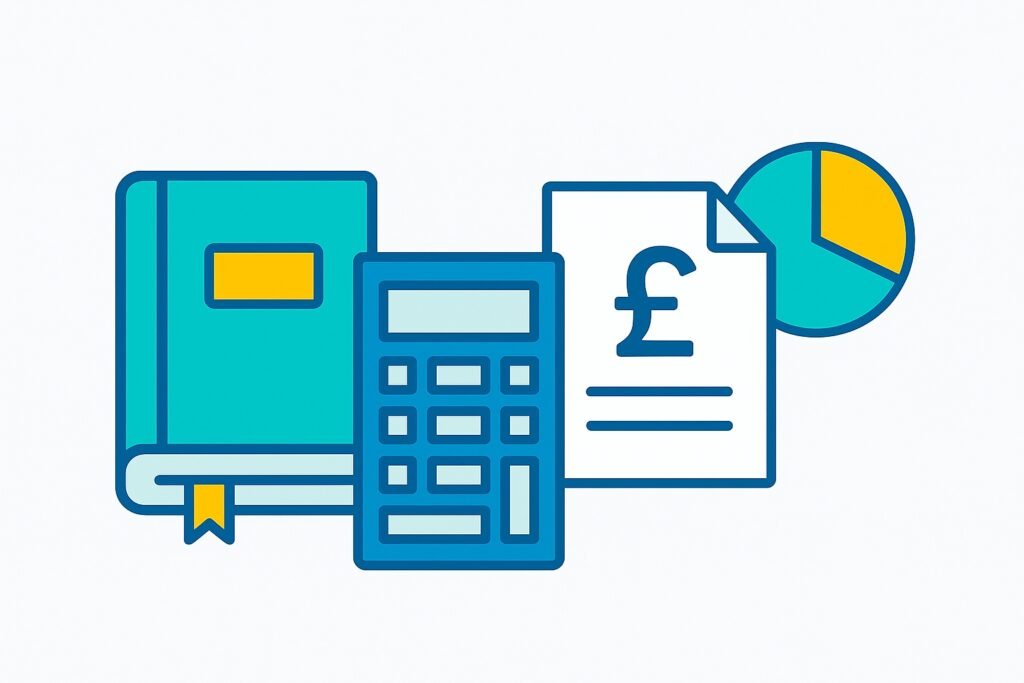
If you decide to work for yourself and start a business as a sole trader (self-employed), you need to set up an accounting system to record your income and expenses.
You also need to find out how business profits are taxed, how to file your tax returns, and how to pay HMRC.
To help you get up to speed with your duties and responsibilities, read our guide to getting your accounts set up painlessly!
1. Open a separate bank account
A sole trader is not legally separate from their business, so a separate business bank account is not a legal requirement. However, there are definite advantages to keeping your business and personal finances separate.
If you only have a personal bank account, you will have to be more explicit in your records and specify which expenses were personal and which were business-related.
This will affect how you record expenses and income, and will take you more time.
Having a separate business bank account allows you to easily record business expenses and income. This, in turn, will make completing your annual accounts and Self Assessment Tax Return (see below) less time-consuming.
Special banking offer for Bytestart visitors
As a Bytestart visitor, if you set up a new bank account with Tide, not only will you receive 12 months of free transfers, but you will also receive 50 cashback, just for opening an account.
2. Know your tax and National Insurance rates
As a sole trader, you need to set aside money to pay income tax and National Insurance on your annual profits.
Make sure you know what the current income tax and the National Insurance Contributions (NICs) rates are.
Income tax
Each individual receives a Personal Allowance each tax year – which is free of tax (if you’re entitled to the full allowance).
The standard Personal Allowance for the tax year 2023/24 is £12,570.
For income above the Personal Allowance, you will be taxed at the following levels:
- The Basic Income Tax rate of 20% on any income up to £50,270
- The Higher Income Tax rate of 40% on any income between £50,271 and £125,140
- The Additional Income Tax rate of 45% on any income over £125,140.
National insurance
The self-employed also pay Class 2 and Class 4 NICs.
Class 2 and Class 4 NICs are both paid to HMRC via Self Assessment.
You pay Class 2 NICs of £3.45 a week (2023/24) if your profits are £12,570 or more a year.
You pay Class 4 if profits are £12,570 or more during the 2023/24 tax year (9% on profits between £12,570 and £50,270 and 2% on profits over £50,270).
From 6th April 2024, Class 2 NICs will be abolished and the Class 4 NIC main rate will be cut from 9% to 8%.
You can find more details on tax and NI for the self-employed here:
- Sole Trader Tax – A guide for start-ups and the newly self-employed
- Guide to National Insurance Contributions (NICs)
3. Bookkeeping
Compared to a limited company, the work involved with bookkeeping as a sole trader is minimal.
You should track your monthly income and expenditure. To do so, make sure you keep records of all your invoices and receipts.
You should keep receipts of any work transactions, as well as rent and bills.
If you own an office, or if you work from home, you may be able to claim rent and bills back from HMRC as a business expense.
Spreadsheets
A spreadsheet for recording your business transactions is a good solution for some, but the functionality may be limited.
Spreadsheets work best for those who want to record transactions by inputting data themselves and for those who prefer to send their own invoices.
Bookkeeping software
More and more business owners use bookkeeping software or an online accounting package to record their business expenses and income.
Online accounting systems are becoming more and more popular with small businesses as they offer extra features such as invoice creation and automatic feeds from your bank account.
You can even file tax returns (self assessment and VAT) directly from the software.
These features cut out duplication so save valuable time.
There are many options available – including FreeAgent, Xero and ClearBooks.
Here’s a useful official HMRC guide to keeping business records if you’re self-employed.
FreeAgent and Xero – special offers for Bytestart visitors
You can get 55% off your first 6 months subscription to FreeAgent, plus 10% off for life too. Find out more about this offer here.
You can also get 90% off a new Xero subscription for 6 months if you click on this link!
4. Claim business expenses
As a sole trader, there will be a number of business expenses you can offset against your business profits, including:
- Cost of stock
- Equipment
- Advertising
- Delivery charges
- Heating and lighting in your business premises
- Office rent
- Postage
- Stationery
- Books and magazines related to your work
- Bank charges on your business account
- Telephone use
- Travel
Expenses you can not claim include:
- Parking fines and speeding tickets
- Childcare
- Client entertainment
- School fees
- Gym membership
- Hairdressing costs
- Training courses that are not related to your job
If you’re self-employed and working from home, some of your household expenses may also be tax-deductible.
You can find out more about how sole traders could pay less tax in these guides;
- Could you cut your tax bill by claiming some of these business expenses?
- How using ‘simplified expenses’ can save you time if you’re self employed
5. Complete a Self Assessment Tax Return
You have to complete an annual self assessment tax return to HMRC if you’re self-employed.
Your tax return provides HMRC with information on your income and expenses, and makes sure you pay the right amount of tax on your profits.
When you register as a sole trader with HMRC, you are automatically enrolled into the self assessment process.
If you don’t register in time you may be charged a penalty.
Completing your Self Assessment is easier if you have detailed and clear business records. This is made far easier if you use online accounting software.
Make sure you don’t make any of these 10 Common Self-Assessment Tax Return mistakes.
If you aren’t confident you can do your self-assessment without making any mistakes, then consider hiring an accountant (see below).
6. Payments on account
Payments on account are advance payments of Income Tax and Class 4 NICs that some have to pay for a future tax year.
You will have to make a payment on account if:
- Your Income Tax and Class 4 NICs total more than £1,000
- You don’t pay tax at source (tax on income before you receive the payment) on more than 80% of your income
Payments on account are due on 31st January and 31st July.
7. Register for VAT if necessary
You must register for VAT if:
- Your turnover is more than £85,000 over a 12 month period
- You receive goods in the UK from the EU with a value in excess of £85,000
- You expect to go over the VAT threshold in a single 30 day period.
However, registering for VAT can be a good idea in certain circumstances even if your turnover falls below the compulsory registration threshold.
For example, being registered for VAT may give customers the perception that you are a larger business. You will be able to display your VAT registration number on your company paperwork and website.
Being VAT registered will also allow you to recover any VAT you pay on purchases for the business.
If you’re registered for VAT, you must keep all your accounting records for 6 years.
Read these guides for more useful information on how VAT works in practice:
- 21 Costly VAT Mistakes businesses make on their VAT Returns
- A Guide to the Flat Rate VAT Scheme & the Limited Cost Trader test
- Checking to see if a VAT registration number is valid – Why it’s important, and the best way to do it
8. Hire an accountant if you need a hand
If you can easily handle the self assessment process, and your business is fairly uncomplicated, you should have no trouble keeping on top of your accounts – especially if you follow the steps we’ve included in this guide.
However, many small business owners decide to hire an accountant to take care of their accounting and tax affairs.
An accountant is particularly useful if your tax affairs are more complicated, or if you have a lot of different accounting entries in your annual accounts.
You might just like to use an accountant to help at self assessment time. Or to provide peace of mind that a professional is looking after your tax affairs while you get on with running your business.
Try these handy guides for some more tips.
- Do you need a bookkeeper or an accountant?
- 15 things to ask when you hire an accountant
- Our growing list of small business accountants
This advice was written exclusively for ByteStart by Lauren Wise from The Accountancy Partnership. The article has been since updated by the Bytestart team with 2023/4 tax data.




